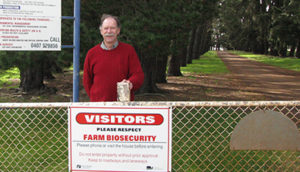Read the latest information on
Foot-and-mouth disease
 You would be hard pressed to find a sheep or cow in the country that would not trade places to live at Bally Glunin Park, near Hamilton in Victoria’s southwest.
You would be hard pressed to find a sheep or cow in the country that would not trade places to live at Bally Glunin Park, near Hamilton in Victoria’s southwest.
This is home to Australia’s first Biosecurity Farmer of the Year – livestock category, Michael Blake, who also took home Wool Producer of the Year at this year’s Australian Farmer of the Year Awards.
Michael and his wife Cathy run a combination of 10,000 superfine Merinos, 2,000 crossbred sheep and 140 Hereford and Limousin cattle on their 1,800-hectare property.
And this year they are set to harvest around 200 tonnes of oats as part of their pasture renovation program and another 300 tonnes of oaten hay to be used on the property for fodder over winter.
Although this might sound like a fairly typical southern Australian farming operation, what is not typical is how Michael incorporates biosecurity and quality assurance into every facet of this highly productive and reputable farming business – from his superfine Merino wool supplying the niche Italian apparel and European Eco Wool markets, to his Meat Standards Australia (MSA) quality beef destined for Europe and even his own cereal and hay crops used on-farm.
Michael developed an interest in quality assurance after a stint working in the glass manufacturing industry.
When he returned home to the family farm in the early 1970s, he adopted the relevant quality assurance practices to form the basis of a farm plan that would take the business to the highest levels of productivity, biosecurity, environmental sustainability and animal welfare.
With a genuine drive for excellence, Bally Glunin Park now complies with at least 12 quality assurance programs – many which were originally piloted on the property – in efforts to guarantee each product reaches the highest and safest standards when it comes to preparation, presentation and delivery.
To ensure that Bally Glunin Park remained weed, pest and disease free well into the future, Michael started operating largely as a ‘closed farm’.
Rams and bulls are now only ever purchased from reputable breeders and are always spelled in isolation paddocks and carefully monitored for health problems before being integrated with other livestock.
He also makes sure his boundaries are well maintained and secure, and that all visitors enter the property through one controlled entry/exit point after seeking permission and having their vehicles washed at the local sale yards and inspected on entry.